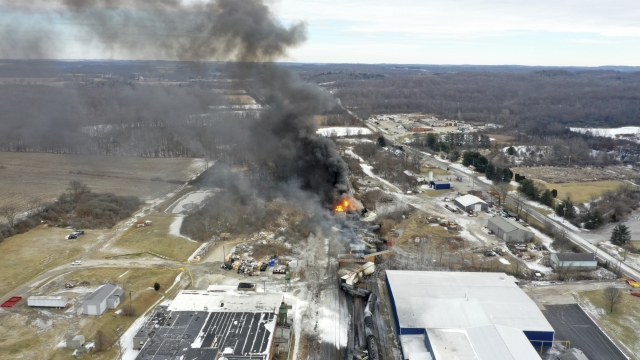After a series of exclusive Scripps News investigative reports about cash awards for top executives at Norfolk Southern, the railroad that owns the train that derailed in East Palestine, Ohio has announced a total overhaul of its cash incentives program.
The Scripps News stories exposed how executives received millions of dollars in cash after the company made its trains longer and took other actions critics say made their trains more dangerous.
Last month, pressure on the company began to build as multiple members of Congress responded to the Scripps News report.
"This is a great credit to you and your investigation that we know about this now," Rep. Seth Moulton (D-Mass.) said in March, while criticizing the railroad for awarding cash incentives. "We're going to be zeroing in on this much more closely."
At the time, Senator J.D. Vance piled on the pressure.
"Instead of paying massive bonuses to railway CEOs, I think we should be asking some tough questions about why we lag behind the rest of the world when it comes to safety," he said.
In March, Sen. Jeff Merkley (D-Oregon) formally demanded Norfolk Southern inform Congress whether it would change the company's executive incentives to better align performance measures with the safety of the railroad. He sent the inquiry in writing, citing material the Scripps News investigation had unearthed, as part of a formal 'questions for the record' process in which members of Congress follow up with individuals who testify before Congress. Merkley sent his inquiry after he said he was not satisfied with recent testimony from Norfolk Southern CEO Alan Shaw.
Scripps News also asked the company if it would consider changing its incentive plan in light of our reporting. A spokesperson said in March she "couldn't make any forward-looking statements at this time."
That changed this week when the same spokesperson, Katelyn L. Byrd, told Scripps News in a statement that the company had recently disclosed to the Securities and Exchange Commission (SEC) a change in that incentive plan, writing that "the compensation of our entire management team will now be based in part on performance on related safety metrics." Byrd also wrote, "We will continue working to get better."
SEE MORE: CDC investigators sick after studying East Palestine derailment
The March 31 filing with the SEC outlined an entirely "new strategy" for executive awards going forward. New performance measures now tie the company's cash awards to safety measures such as injury rate and accident rate, which is the same format used by the Federal Railroad Administration (FRA). The initial Scripps News report pointed out Norfolk Southern had been touting reductions in accidents, but later acknowledged it was only talking about those accidents that occurred on some of its train lines. Late this past year a report from the Government Accountability Office (GAO) found Norfolk Southern's reportable accident rate, as counted by the FRA, had hit a 10-year high by 2021.
The company's new incentive plan for executives also entirely ends any reliance on a controversial financial target known on Wall Street as the "operating ratio," which had been the primary driver of Norfolk Southern's cash awards. Critics say tying incentives to that metric, which measures operating expenses against operating revenues, discourages the company from spending money on needed safety reforms.
The operating ratio is a number that began to dominate the railroad industry in recent years, with some even saying the business practices of railroads had turned into the "cult of the operating ratio." Scripps News previously reported that Norfolk Southern's heavy emphasis on operating ratio worried industry insiders, who believed the number was being driven down by cost-cutting, which produced bigger cash awards for executives, but meant its operations were becoming more dangerous.
"The disappearance of operating ratio from the bonus criteria for Norfolk Southern executives is a major accomplishment," said the former director of research for the Federal Railroad Administration, Steven Ditmeyer.
Ditmeyer was among other vocal critics from inside the industry who spoke out as part of the initial Scripps News investigation, which focused on cash incentives at the railroad.
The new incentive structure now ties 10% of cash awards directly to safety measures.
"I think that's, on one hand, wonderful. But they are still fairly small percentages of the bonus package," Ditmeyer said.
Some early critics of the railroad believe the overhaul goes far enough, however, to make an impact.
"I think it will make a difference in safety," said Rep. Moulton. "They've gotten a hell of a lot of criticism, much of it well-deserved, but they deserve some credit for this."
Moulton said he will be looking to other railroads across the industry to follow Norfolk Southern's lead and tie more of their executive awards to safety.
Amy Fan and Rosie Cima contributed to this report.
Contact the lead reporters on this story at mark.greenblatt@scripps.com and carrie.cochran@scripps.com.
Trending stories at Scrippsnews.com



